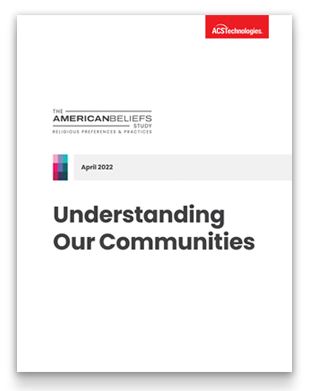Part 1 of 4
We hear it from Pew Research. From Barna. And we see this in our own churches. Attendance is down. The people in the church are typically Baby Boomers (1946-1964) with fewer Millennials (1981-1996). Fewer people are giving financially, and those who do are part of an aging group. So what about the church or religious communities that have lost their appeal to the Boomer generation today? In this four-part series, we will dig deeper into the generational reasons from our ACST American Beliefs research based on 15,000 respondents’ personal, social, and religious concerns.
Generations disconnect from the church.
Believe it or not, most life concerns, social issues, and religious views are similar across all generations. According to the Boomer generation, social issues like a mother and father should raise children if possible, the planet’s environment, having great hope for the future of their community, and America’s leadership in the world are of high concern. As we have seen fewer people in the church over the years, this generation has the least amount of individuals disconnecting from a faith community at only 2% over the past ten years compared to the other generations. This is because the church was highly enforced, and families believed in attending church together regularly.
Did you know 61% of the Boomer generation is inactive in a religious community today? Interestingly enough, 18% have no affiliation with a religious community. Most unaffiliated individuals live in the West-Midwest region of the U.S., are retired, are men, and live in a two-person household.
Not seeing the church as being relevant.
So why do people lack the desire to attend church? For starters, 45% do not believe in God or feel that many gods exist. They think that people in the church do not behave as Jesus would, religious people are too judgemental, the church is too focused on money, and the religious leaders are untrustworthy. More than half feel that church isn’t relevant to their life today. This generation has been through more bad church experiences than other generations are not interested in all the politics and drama that can surround churches.
A little over one-fourth of the Boomer generation attend a weekly church service. In fact, 17% of those no longer active in a religious community were active ten years ago. Why are so many people leaving the church?
As children have grown and moved away to start their own families, parents and grandparents may choose to move closer to their kids and grandkids. Finding a new church at a later stage of life can be challenging. 91% are not interested in driving more than 30 mins away to find a church. Today, partially thanks to the pandemic, more churches offer online church or live streaming services, making it more convenient for people to do “church” on their timetable or from the comfort of their homes.
How can churches reach the unaffiliated Boomers?
Understanding why Boomers are leaving or have left can help churches today show their community that not all churches are alike. These individuals seek warm and friendly encounters and opportunities to develop personal relationships. This may not be the most tech-savvy generation, but many are connected with social media. Daily, 49% of unaffiliated Boomers are on Facebook, and 24% are on YouTube. Very few are on IG, and even fewer are on TikTok or Snapchat. Church that relies on Facebook to communicate with the community would be more successful in reaching this generation than the younger generations. Churches must find outlets to reach the Boomers who are disconnected and entice them to come back to church. These individuals always give more to the church and are more willing to volunteer when needed.
Next, up – Gen X views on the church
Downloading the American Belief Reports will allow you to uncover
- The religious activity level of Americans in communities and how it has transformed over the past decade.
- The most pressing concerns Americans face today.
- Good news and bad news about the theological beliefs of Americans and how they view places of worship.
- The priorities people want in ministry programs offered to them.
Heather joined the ACST team in 2015 within the Support Department. Today working on the Strategic Expertise team, she oversees the operations of the Strategy and Brand team. Before joining ACST, she spent several years in Real Estate as an appraiser. She realized her passion for data, research, and the value of being a voice for the client. Heather has led bible studies at her church and participated in different ministries.





